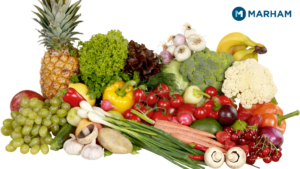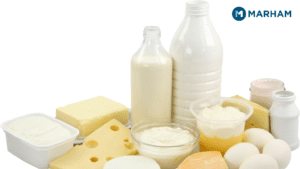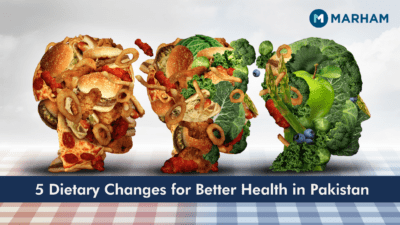One can eat healthily by making a few dietary changes for better health in Pakistan. You just have to make a few changes, swap a few meals, and voila, you’re there!
Highlights:
- To improve your overall health in Pakistan, it is necessary to make dietary changes.
- Unhealthy diets can cause non-communicable diseases (NCDs) which is a major cause of mortality.
- Switch from unhealthy, fatty, and processed foods to healthy, nutritious, and organic foods.
- Include eggs, vegetables, fruits, meat, milk, and whole grains in your diet.
Dietary intake is essential for health. Unhealthy diet and meals can cause non-communicable diseases (NCDs) which are a major cause of mortality in the world. It is reported that an unhealthy meal is associated with low profession, low education, and low socioeconomic conditions.
In Pakistan, there are many spots where unhygienic food is served. Many people do not follow a proper and balanced diet plan. This can lead to poor health conditions. Therefore, we have gathered 5 simple dietary changes for better health in Pakistan.
You can also take professional advice for sustainable diet changes from the best nutritionist in Pakistan.
5 Dietary Changes for Better Health in Pakistan
Food is important for providing nutrients such as fats, proteins, carbohydrates, vitamins, and minerals. These nutrients are essential for growth and development. Not only one food can provide all nutrients in a sufficient amount to fulfill the requirements of the body.
Therefore, it is necessary to maintain a balanced and healthy diet by eating a range of healthy foods.
1. Add Fruits and Vegetables
One of the most important dietary changes that you’ve to make while living in Pakistan is to include fruits and vegetables in your diet. Include leafy and non-leafy vegetables of different colors.
Leafy vegetables include mustard green, lettuce, spinach, fenugreek, squash, carrots, etc. On the other hand, non-leafy vegetables include turnips, reddish, ginger, onion, garlic, pumpkin, etc. Vegetables are rich in dietary fiber, minerals, vitamins, iron, and phytochemicals. They protect the body from chronic diseases and infections.


Moreover, one should include fruits in their daily routine. Fruits are an excellent source of potassium, fiber, minerals, vitamins, and energy. They have phytochemicals that can reduce oxidative stress. They also protect the body against chronic diseases and the risk of cancers.
2. Consume Milk and Milk Products
One should include milk and milk products in their daily routine. Milk and milk products play a crucial role in maintaining a healthy diet. It includes yogurt, milk, cheese, curd, custard, lassi (buttermilk), etc. They are a good source of calcium, protein, phosphorous, vitamins, magnesium, etc. A sufficient amount of milk products and milk are recommended.
A deficiency of calcium can cause several medical conditions in children, adults, and in older age. Osteoporosis is a common disease that affects women due to a lack of calcium, vitamin D, and phosphorous in the bones.


3. Start Eating Meat
Meat is the major source of protein. It is also one of the major dietary changes that can contribute to the betterment of health in Pakistan. Many children and young adults avoid eating meat but this can cause several deficiencies in the body.
It includes mutton, poultry, beef, fish, etc. These are rich sources of proteins which are body-building foods. Other than proteins, they also provide minerals and vitamins.
An adequate amount of meat, eggs, and fish is good for controlling and reducing stunting, kwashiorkor, anemia, and zinc deficiencies. The body easily absorbs and processes the zinc and iron present in animal proteins. They enhance growth and improve cognitive abilities and motor development. Moreover, it also increases the physical activity in children.
4. Switch to Whole Grains and Pulses
You can eat healthy by swapping refined grains with whole grains. Include whole grains in your diet because refined grains have been seen to cause many health issues. On the other hand, whole grains have been associated with a range of health benefits such as reducing the risk of Type 2 Diabetes, cancer, and heart disease.
Whole grains are an excellent source of:
- B Vitamins
- Fiber
- Minerals such as Iron, Zinc, Magnesium, etc
There are varieties of whole-grain breads available in the market. It is always better to read the ingredients and ensure that the product is made up of whole grains. It shouldn’t be a mixture of whole grains and refined grains.
Apart from whole grains, add pulses such as lentils, red beans, chickpeas, mung beans, and mash to your diet. They are also a rich source of plant proteins, vitamins, and minerals. Legumes and pulses provide dietary fiber and reduce low-density lipoprotein (LDL) cholesterol (bad cholesterol) in the body. Moreover, it also lowers the risk of heart and chronic diseases.
5. Take Eggs in Breakfast
Last but not least eggs! Eggs are highly nutritious and are an excellent source of total bioavailable protein. They are healthy especially if you take them in the morning. Apart from proteins, they are enriched with essential nutrients such as choline.
If you add eggs to your breakfast, they can give you a feeling of fullness. It is also helpful in weight loss because it lessens the feeling of hunger and reduces the amount of calories consumed in the day after breakfast.
Therefore, replace your breakfast with eggs and see the magic!


Tips for Dietary Changes
Follow the following tips and tricks to make dietary changes in your life.
- Increase fiber intake by eating more vegetables, fruits, and whole grains.
- Reduce Sugar by limiting processed foods, sweets, and sugary drinks.
- Go for lean protein sources such as fish, poultry, and lentils.
- Drink plenty of water throughout the day.
- Cook your food in healthy oils. You can switch from ghee to canola oil or olive oil.
The Bottom Line
It is not recommended to completely overhaul your diet at once. It can upset your stomach and body.
Instead, try to take baby steps and make small dietary changes for better health in Pakistan.
If you don’t know where to start, then you can also consult the best nutritionist in Pakistan.
Frequently Asked Questions (FAQs)
1. What are the Reasons for Dietary Changes?
Dietary changes are usually made due to biological, economic, physical, or social determinants. Moreover, it is very important to make dietary changes for a healthy overall being.
2. Why Do Dietary Requirements Change?
Dietary requirements depend on a person’s weight, height, muscle mass, activity level, and other factors. For example, people in old age need few calories to maintain their weight and stay active.
3. What is the Best Diet to Improve Your Health?
The best diet to improve your health is to have a diet rich in vegetables and fruits. It is seen that a diet rich in fruits and vegetables can provide many health benefits and prevent many diseases.

